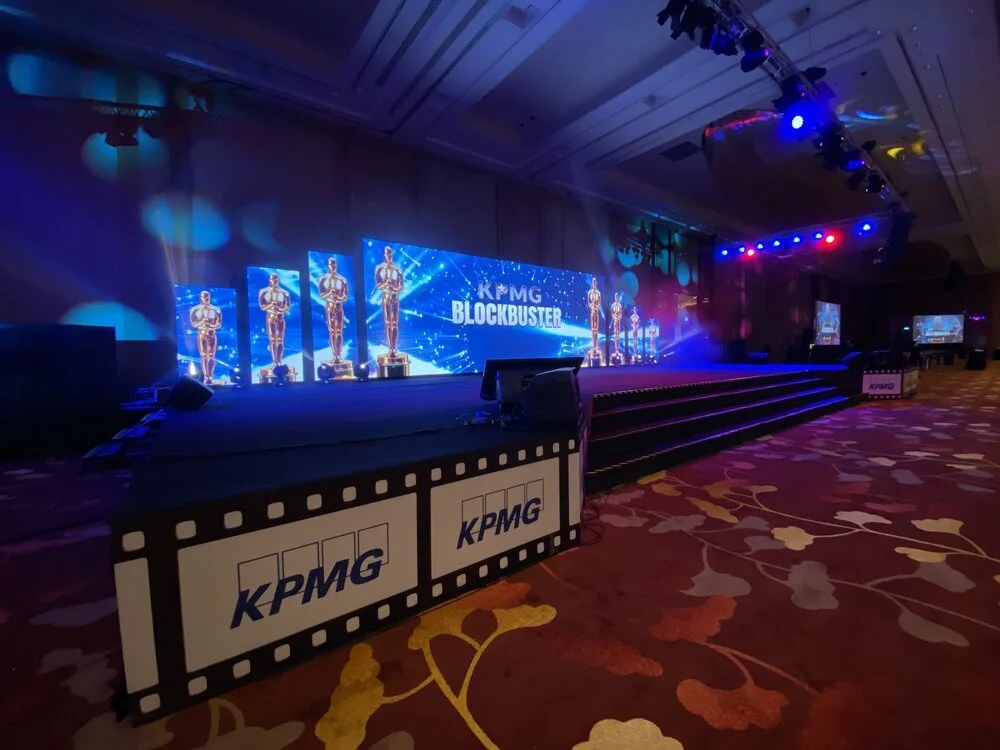How to Plan an Event Without an Event Organizer
Thinking of planning your own Dinner & Dance, brand activation, or corporate event in Singapore? It’s definitely possible — and many companies have tried. If you’re considering taking it on yourself, here’s what the journey might look like.
Step 1: Finding the right venue
Every event begins with a space. You’ll need one that fits your guest count, has the right layout, and ideally comes with AV equipment. It also helps if it’s central enough for everyone to get to easily. Many venues will have packages with different inclusions, so it’s worth taking time to compare them side by side.
But here’s where it gets tricky: contracts often come with fine print. Overtime charges, corkage fees, or restrictions on outside vendors can quickly add up. And if your event requires trussing points, LED walls, or custom staging, you’ll need to make sure the venue can even handle it. Otherwise, you could find yourself back at square one — or paying extra to make things work.
Step 2: Working with multiple vendors
An event usually requires quite a few partners — caterers, AV teams, décor suppliers, emcees, performers, and photographers, just to name a few. On paper, it’s just a matter of engaging each one. In practice, it means juggling endless email threads, WhatsApp groups, and site visits just to keep everyone aligned.
The harder part comes with costs. Midway through planning, you might suddenly be told about extra charges — an additional sound technician, a late-night delivery fee, or upgraded décor that “really makes a difference.” When you’re handling things on your own, it can be difficult to tell if these add-ons are essential, or just a way for vendors to make a little extra. Either way, the adjustments can throw your budget off balance very quickly.
Step 3: Designing the theme and program
The theme sets the tone for the entire event. A “Hollywood Glam” Dinner & Dance, for example, might mean red-carpet backdrops, a custom playlist, themed activities, and matching stage design. Pulling all these elements together is exciting — until you realize how many moving parts need to stay consistent.
On top of that, the program itself needs careful planning. Too long, and guests get restless. Too short, and the night feels flat. Without experience, it’s easy to either overload the schedule or leave awkward gaps. And if the CEO decides to make an unscripted 30-minute speech? You’ll need to adjust everything on the fly.
Step 4: Executing on the big day
Event day is where everything happens at once. Guests start arriving earlier than expected while vendors are still unloading equipment. The AV team is asking where to run their cables, the décor crew needs more time, and the caterer is chasing you for access to the kitchen. At the same time, the emcee is rehearsing lines, the CEO’s assistant is requesting last-minute changes to the slides, and someone has just informed you that the vegetarian meals were “forgotten in the rush.”
Even with months of planning, the reality is that dozens of moving parts collide within a few short hours. And when you’re running the event yourself, every question, delay, or hiccup finds its way to you. Instead of greeting guests or enjoying the program, you’ll be sprinting between walkie-talkies, supplier calls, and urgent problem-solving. By the end of the night, you’ll wonder how you were in the room the whole time yet missed most of what actually happened.
Step 5: Wrapping things up
When the last song fades and the guests head home, it feels like the job is done — but really, it’s just another phase. Vendors are waiting for final payments, rental companies need their equipment back, and the venue is asking for the space to be cleared immediately. At the same time, you’re dealing with lost-and-found items, missing receipts, and a photographer who wants to confirm which shots should be edited first.
And then comes the paperwork: reconciling invoices, cross-checking extra charges, and preparing reports for management. It’s easy to underestimate how much there is to close off. Without proper systems, the “end” of the event can stretch into days or even weeks of follow-up — long after the excitement is over.
A final thought
Yes, you can plan an event without an organizer. It just means taking on every single detail yourself — from contracts and vendors to creative direction and last-minute crises. It also includes the less obvious tasks, like making sure the right licenses and permits are applied for, or ensuring there are enough engaging activities to keep guests entertained throughout.
For many, that’s exactly why they turn to a professional event management company in Singapore. At Into E Projects, we make sure all these hidden challenges are handled smoothly — and if changes do arise, we’ve always been transparent with costs, so you’ll never be surprised by sudden additional charges. That way, you can focus on what really matters: enjoying the event you’ve been working toward.






